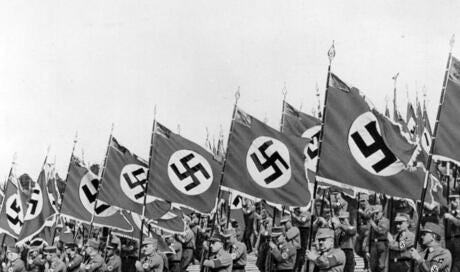The Weather in Berlin
Germany held their national elections a week ago, and the governing party, the Social Democrats, got voted out of power. They had their worst results since the Second World War, 16% of seats in the Bundestag, third place. The center-right Christian Democrats came in first, with 28.5%, which means they have to form a coalition to take power, but the real news is that AfD, the Alternative for Germany, came in second, with 20.8% of the vote. Which adds up to one in five German voters (turnout was north of eighty per cent) supporting neo-Nazi ethnic purity, served with a side of Russian dressing.
AfD – in German, the initials spell out Alternative für Deutschland - is a far-right, Islamophobic, extreme nativist political party that’s gained market share by selling Völkisch resentment to the disenfranchised. They first got traction in the failed former East Germany, where reunification didn’t live up to its gaudy promises. The Communist DDR invested in smokestack industries, and although the Federal Republic put a lot of effort into integrating an underskilled workforce and remediating the worst of the legacy pollution, there was still a lot of poison in the ground, and a lot of poisonous rancor in the body politic. For the many Ossis left behind, aid from the West was conditioned on condescension.
(Symbolic of this relationship, Wessi condescension, Ossi embarrassment, were Trabis, the cheap East German cars made for domestic sale. When the Wall came down, Trabis were seen everywhere in the West, their two-strokes smoking and coughing and stalling in traffic, and with a top speed of 60, nowhere near fast enough for the West German autobahns. They added insult to injury, on both sides.)
For many West Germans, the recovered East was a burden, a social and political stigma. After the defeat of Hitler and the Nazis, the Eastern sector spent another forty-odd years under what amounted to Soviet occupation, like the other Warsaw Pact satellites, a buffer state protecting the motherland from attack. West Germany turned into the dominant engine of a postwar European economic surge; East Germany stagnated. By the time reunification rolled around, Germans in the West - a self-satisfied bunch, by and large - were asking themselves what they owed their cousins on the far side of the Elbe. We prospered, they did nothing to help themselves. This view was widely shared. Historical memory, in Germany, is often a matter of convenience, and irony isn’t what first springs to mind, as a hallmark of the national character.
Small wonder, then, that chauvinism and grievance found fertile soil in the former Communist East. They were treated as second-class citizens, and welfare queens. In the residue of Stalinist Modern, neglected apartment blocks and a lifeless infrastructure, the wreckage of a command economy, skinhead sentiment festered. The anti-immigrant narrative is front and center. Turks and Yugoslavs were already a visible presence, but now there were Afghans and Syrians, Gypsies and Poles, economic refugees. More to the point, they bring with them racial and cultural pollution, and the menace of Islam. In a stroke, we conjure up the flaccid animosities of the 1930’s, paint their face with a whore’s smile, and sell a tired name yet again, old wine in new bottles.
As if this toxic stew weren’t enough, let’s introduce Elon Musk and J.D Vance to the mix. Vance showed up at the recent Munich Security Conference to lecture Europeans on the danger within, but he didn’t mean the far right. He fixed instead on social media regulation, and the MAGA complaint that right-wing voices are being stifled. He called out Germany specifically as an enemy of free speech, for maintaining a political ‘firewall’ to isolate AfD. Elon, never shy of attention, actually endorsed AfD, and promoted AfD party leader Alice Weidel with an interview on X, widely amplifying her message.
Oh, and the Russians. Russian influence operations went into overdrive, not to boost AfD directly, which is too obvious, but to discredit the center and center-left. Candidates for the CDU and the Greens were smeared, and interestingly, the disinformation tied both campaigns to corruption involving Ukraine. The target, plainly, is Zelensky, and ongoing Allied support for Kyiv. There’s a confluence, or a community of interest, in the signals from the American side, and the party line from Moscow.
There’s a way to think about this, but I’m at a loss how to tell you what it is. The world is a cruel and unruly place, and anxiety and uncertainties push us into retreat. A friend of mine once used the phrase, “intolerance of ambiguity,” and she meant that we all have a weakness for easy answers. The rise of Hitler, and Germany’s slide into Nazism, was an almost chemical reaction to a volatile composition, an unstable political, economic, and social geography. There was no roadmap. This seems like a pattern we go on repeating, which apparently comes from a sense of powerlessness. It’s like being stuck in an abusive marriage. Jeez, if I hadn’t of provoked him, he wouldn’t of hit me. I honestly don’t know how to sort this out. Fascism is comfort food; we keep asking for seconds.




